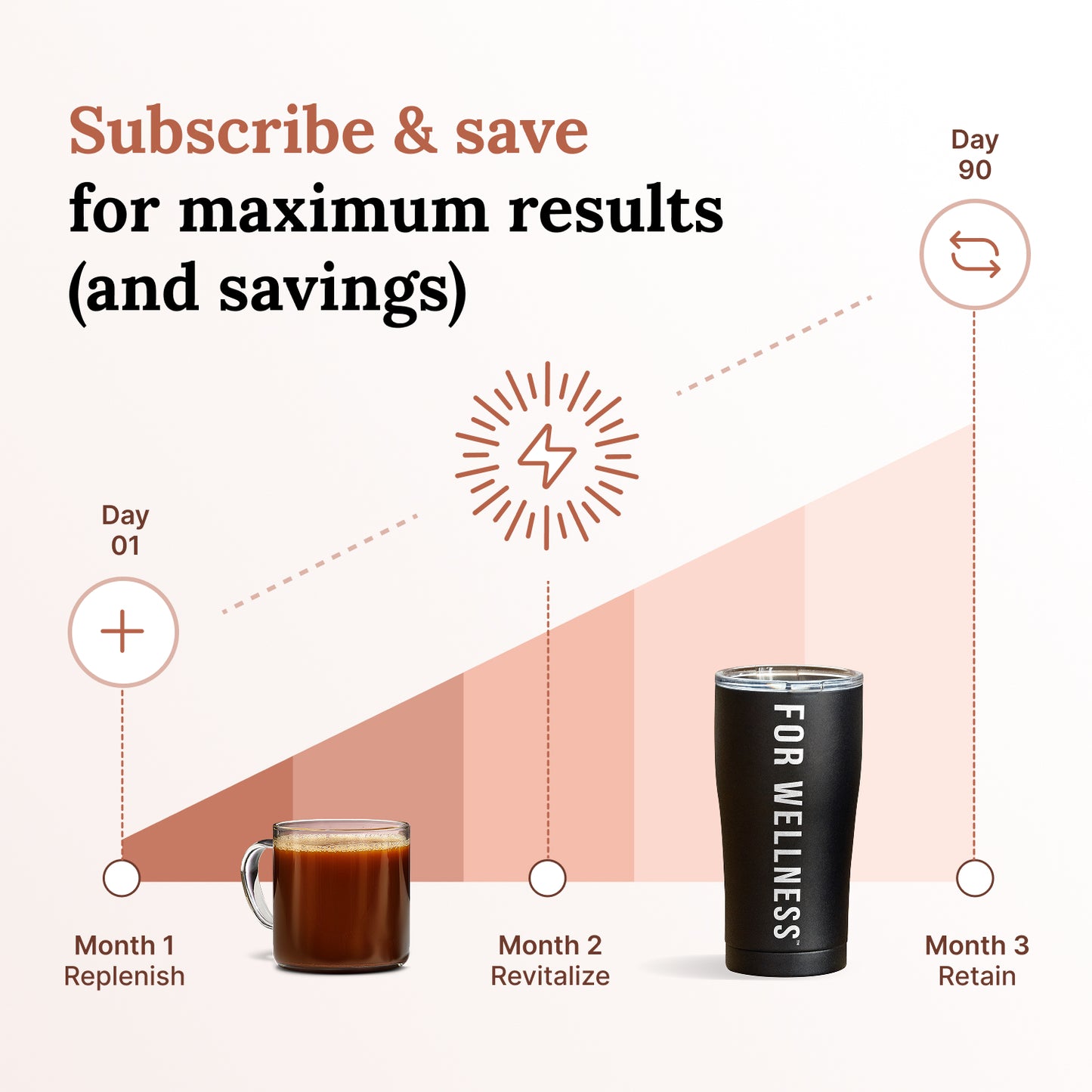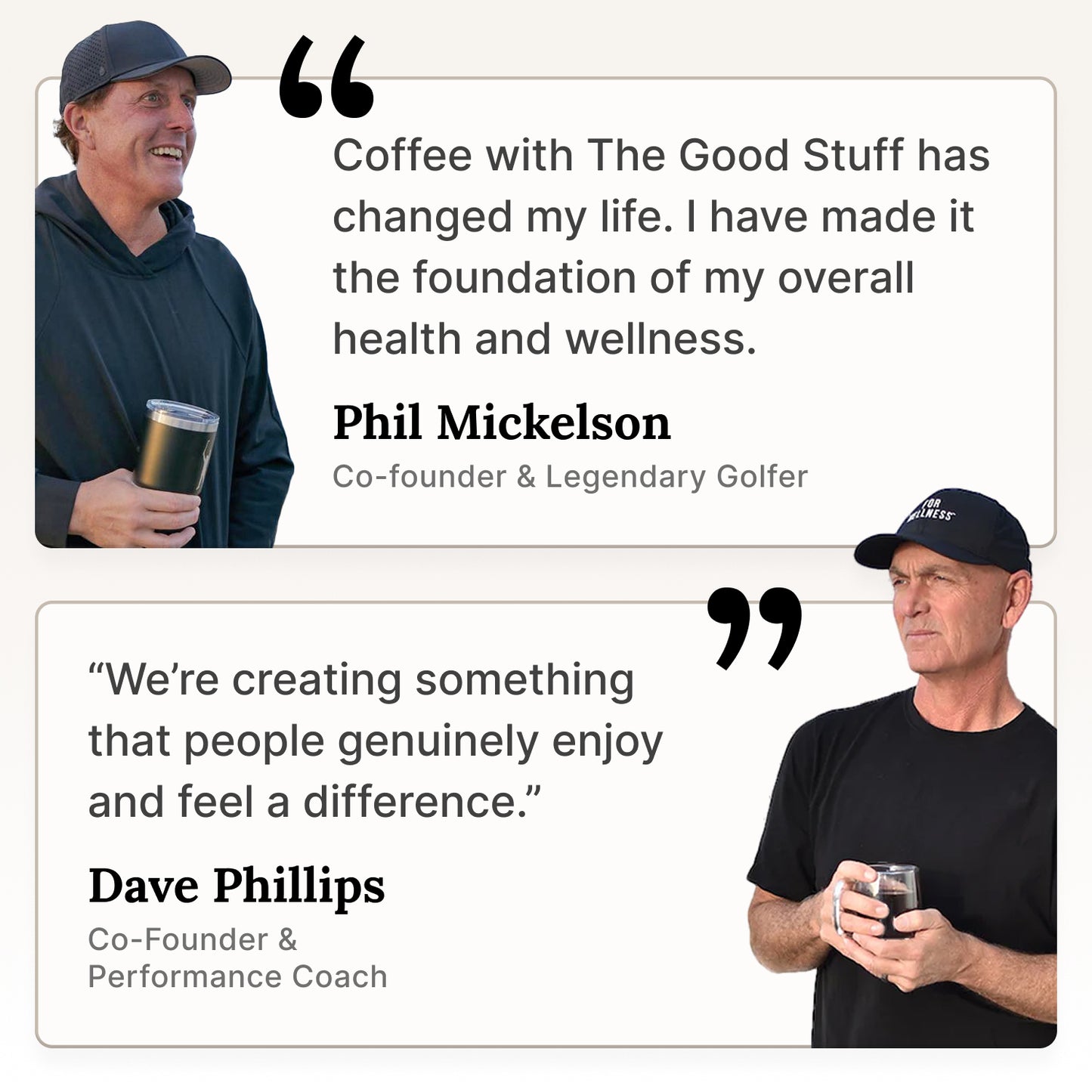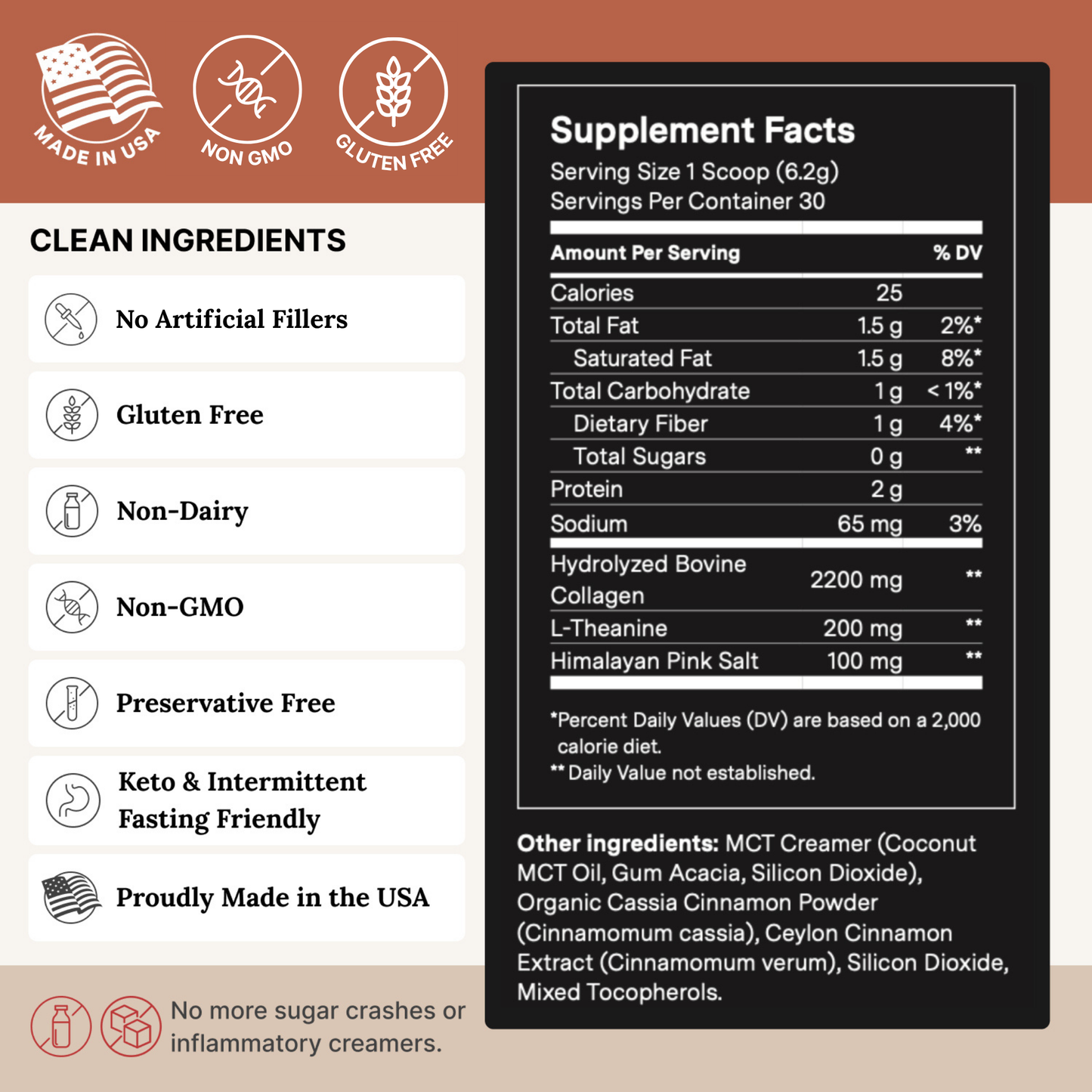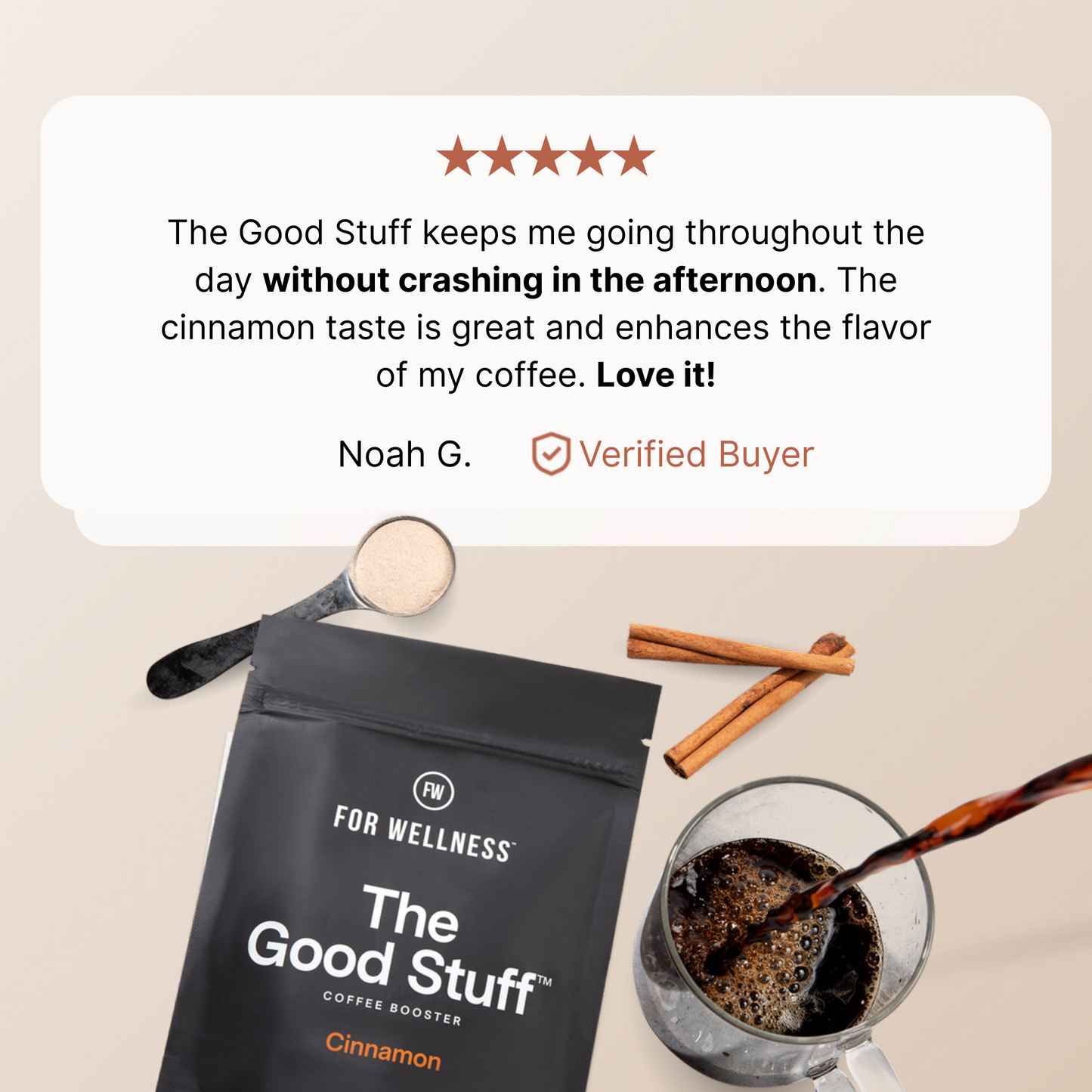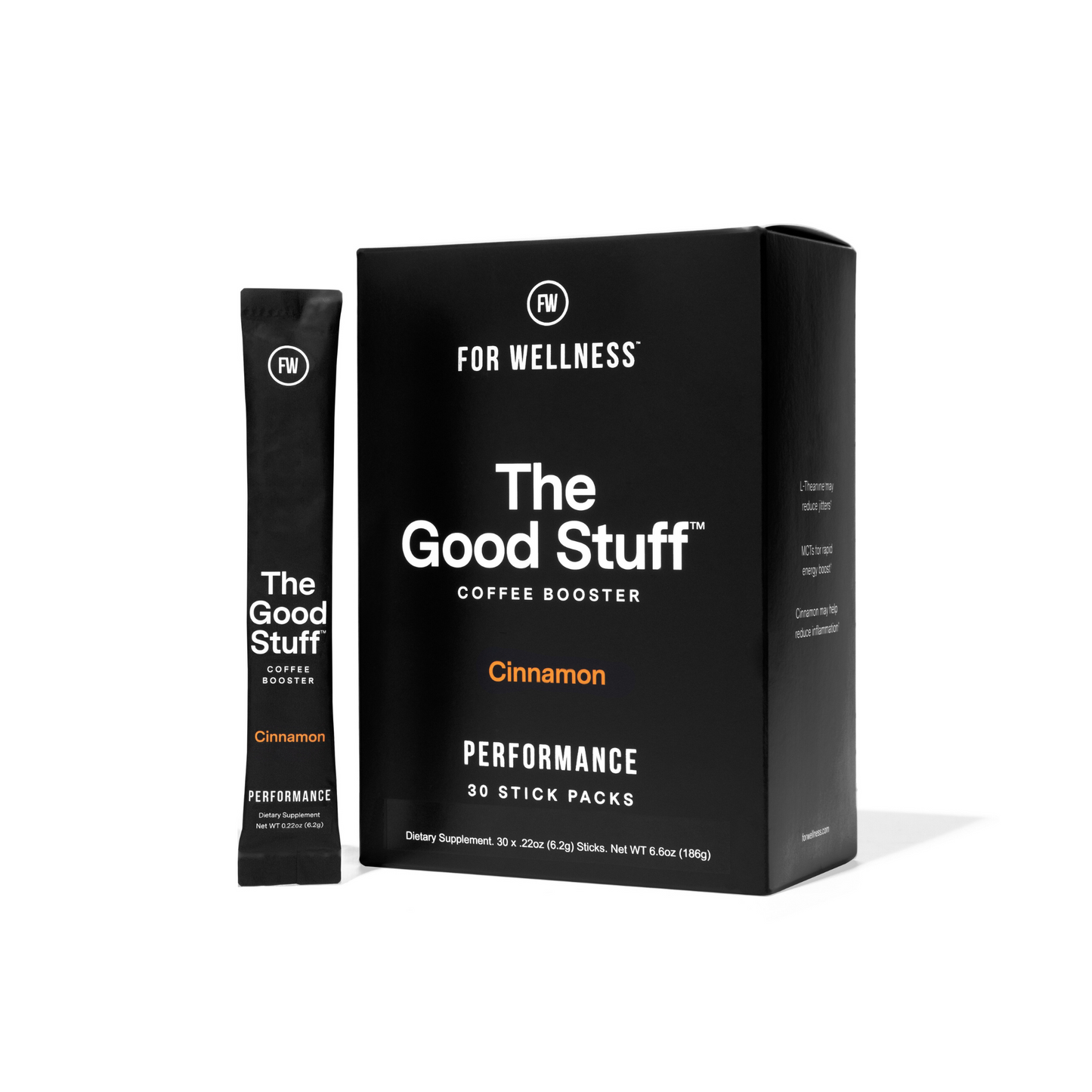Confronted with declining health and a psoriatic arthritis diagnosis in 2010, renowned golfer Phil Mickelson knew it was time for a serious lifestyle transformation. Under the expert guidance of his close friend and elite performance coach, Dave Phillips, Phil overhauled his lifestyle, zeroing in on improved nutrition, consistent physical exercise, and the incorporation of coffee.

This proactive shift not only elevated his performance on the golf course, but also revitalized his overall physical wellness. While Phil used to get sick every 2-3 months, he has not been sick once in 12 years!
Why is Phil’s story an important touchstone in the conversation about longevity?
Longevity is not merely the extension of life, but the extension of quality life. It means not only living longer, but living better—feeling vibrant, enjoying effortless mobility, and being able to engage in activities you love, like hitting the golf course week after week.
In this guide, we'll show you how to follow in Phil's footsteps—no matter your age—and create a life rich in wellness and longevity.
How to Structure Your Day for Physical Longevity
Maintaining good physical health as you age requires making conscious choices from the moment you wake up to the time you go to bed. The following sections will guide you on how to optimally structure your day to maximize your well-being.
Morning Routine
The way you start your morning dictates the tone for the rest of the day. Embracing a health-focused morning routine can set you on the right track for making good choices throughout the day.
Here’s how to build a morning that prioritizes longevity and well-being:
Hydrate upon waking
Starting your day with 16 ounces of lemon water might seem like a small habit, but it can have a big impact on your physical well-being in so many ways:
- Digestion: The acid in lemons can help supplement stomach acid levels, which break down food.
- Hydration: Overnight, your body becomes dehydrated. And even a small fluid loss—as little as 1-2% of body weight—can hinder your physical and cognitive performance.
- Joint pain: Cartilage, which serves as the cushioning material between your joints, is made up of as much as 80% water. Dehydration can negatively affect cartilage function, leading to increased friction between the bones and, subsequently, joint pain. What’s more, one study showed that when people were mildly dehydrated, their pain sensitivity increased by 43%. Staying well-hydrated can help maintain cartilage integrity and reduce the risk of joint pain.
Have a cup of Joe
One of the standout elements in Phil Mickelson’s wellness journey was the addition of coffee to his daily routine. Serving as more than just a morning pick-me-up, Phil says the anti-inflammatory and antioxidant benefits of coffee help him maintain his overall health.
Don’t think a cup of Joe can have such a big effect? Think again!
Coffee has been shown to support energy and focus, mood, antioxidant intake, and reduced risk of certain health conditions, including type 2 diabetes, heart disease, and dementia.
☕️For a health-boosting cup, try our Organic Arabica Coffee with a scoop of The Good Stuff™ performance supplement.
Made with five functional performance boosting ingredients: L-Theanine, MCT oil, collagen, Ceylon cinnamon and Himalayan salt, this tasty powder supports jitter-free energy, mood, and focus.


The Good Stuff - Performance
-
One scoop will infuse your coffee with healthy ingredients
-
Ditch the bad stuff like sugar, dairy, and artificial creamers
-
Fights inflammation and supports skin and joint health
-
Makes your coffee taste great
Eat a balanced breakfast
Nutrition is a fundamental pillar in the quest for longevity, and one way of eating continues to make headlines for its potential to increase your lifespan.
One study of over 12,000 middle-aged adults found that those who stuck closely to a plant-based or vegetarian diet had an 18% to 25% lower risk of dying from any cause. A plant-based diet incorporates an abundance of fruits, vegetables, legumes, and whole grains, complemented by smaller portions of dairy and lean proteins if desired.
Kickstart your day with a well-balanced breakfast that blends protein, healthy fats, and fiber. This trio will not only satiate you, but also offer sustained energy to tackle your day.
Here are a few balanced breakfasts to try:
- 2-3 eggs paired with avocado and a side of antioxidant-rich berries
- The Everything Smoothie, which includes greens, fruit, protein powder, The Good Stuff™, yogurt, and oat milk
- Easy-peasy overnight oats made with rolled oats, your milk of choice, greek yogurt, The Good Stuff™, and other goodies
Engage in physical activity
The adage "use it or lose it" rings especially true when staying active and healthy as you age.
Remaining sedentary can lead to muscle loss, decreased bone density, and a host of other health problems. The inverse is also true: regular exercise can help you maintain muscle tone, bone strength, and joint health.
It can also improve your cardiovascular health and mental well-being.
Kick your day off with 30 minutes of moderate-intensity aerobic activity.
A morning workout will not only provide a host of health benefits, but also invigorate you for the tasks ahead. Choose exercises that elevate your heart rate, like brisk walking, hiking, jogging, or swimming. Aim to do this five days a week.
The Centers for Disease Control and Prevention (CDC) also recommends doing a 20-30-minute strength training workout that engages all major muscle groups two days a week.
🍒Before your workouts, enjoy a serving of our tart cherry Recovery Gummies™—a pre-workout boost that provides a rapid source of energy from glucose, key electrolytes for muscle support and fluid balance, and VitaCherry® Sport (derived from tart cherries) to aid muscle recovery and soreness after exercise.
Midday Routine
The choices you make during the middle of the day can either bolster your morning’s good work or derail your healthy intentions.
Here’s how to maintain your momentum for a life focused on longevity and optimal wellness during those critical midday hours:
Eat a balanced lunch
Your midday meal should balance protein, complex carbs, and vegetables, providing satiation and energy. Opt for lean proteins like grilled chicken or tofu, healthy carbs like quinoa, brown rice, or sweet potato, and plenty of colorful vegetables.
Take short movement breaks
Sitting for prolonged periods has been linked to various health issues, including joint problems, obesity, increased blood pressure, high blood sugar, and abnormal cholesterol levels.
These conditions are detrimental to longevity and can really throw a wrench in your ability to be active. Throughout your day, stand up, stretch, and take a brief walk (even just around your house) every 20-40 minutes.
These short movement breaks can improve circulation, engage your muscles, and even enhance focus.
Be mindful of work ergonomics
While it might be tempting to slouch in your chair as you work, the way you sit while working can have long-term consequences on your ability to stay active as you age.
Adjust your workstation so your monitor is at eye level and your feet are flat on the floor. This alignment can help stave off back and neck issues that hinder mobility.
Evening Routine
How you close your day is just as important as how you start it. An evening routine focused on relaxation and healthy choices sets the stage for restorative sleep and prepares your body for the day ahead.
Here’s how to design an evening that champions longevity and overall well-being:
Keep dinner light and healthy
Choosing a lighter meal that includes lean proteins and vegetables is the way to go for dinner. Meals that are easier to digest help to facilitate better sleep and allow your body to tend to other upkeep overnight (rather than focusing on digesting that Quarter Pounder from Micky D’s).
Options like grilled fish accompanied by steamed vegetables or a wholesome vegetable soup are excellent choices for an evening meal that nourishes without burdening your system.
Engage in a wind-down routine
An hour before bed, start preparing your body and mind for rest. This could include activities like reading, light stretching, or having a cup of herbal tea.
The aim is to signal to your body that it’s time to relax and prepare for sleep. Avoid using electronic devices an hour before bed, as the blue light emitted from these devices can keep your brain activated and negatively affect sleep.
Practice good sleep hygiene
Sleep is perhaps one of the most underrated aspects of maintaining an active, healthy body. While it might seem like you’re not doing much while you’re asleep, your brain and body are actually tending to a wide array of biological upkeep that maintains your physical and mental health.
Research has shown that going without sleep for 24 hours is similar to having a blood alcohol concentration (BAC) of .10% (above the legal driving limit).
That’s certainly not conducive to living a healthy, active life! So, how much sleep is enough? Aim for 7-9 hours of quality sleep.
Make your bedroom a sanctuary by keeping it cool, dark, and quiet. Use blackout curtains, earplugs, and a white noise machine if needed.
Mental Longevity
Staying mentally active is important for maintaining longevity because it can have several positive effects on cognitive health and overall well-being. While it's not a guarantee of a longer life, it can contribute to a higher quality of life as you age.
Here are some reasons why mental activity is important for longevity:
-
Cognitive Reserve: Engaging in mentally stimulating activities throughout your life can help build cognitive reserve. Cognitive reserve refers to the brain's ability to withstand damage or deterioration due to aging or disease. People with greater cognitive reserve are often more resilient to cognitive decline and diseases like Alzheimer's.
-
Delayed Cognitive Decline: Studies have shown that those who stay mentally active are less likely to experience cognitive decline as they age. Activities such as reading, learning new skills, and solving puzzles can help delay the onset of conditions like dementia.
-
Social Engagement: Many mentally stimulating activities involve social interaction, such as group discussions, book clubs, or learning new skills in a class setting. Social engagement has been linked to improved mental health and overall well-being, which can contribute to a longer, healthier life.
-
Lifelong Learning: Continuing to learn new things throughout your life can be intellectually fulfilling and personally rewarding. It keeps your mind active and curious, which can promote a sense of purpose and motivation to stay healthy.
There are lots of ways to keep your brain active, and the good news is they're all fun! Reading regularly, solving puzzles and brain games, enrolling in local classes, meditation, strategy board games, and volunteering, are just some ways to enhance your mind's longevity.
Even catching up with your friends and family can help keep your mind active. Social interactions stimulate your brain and provide emotional support.
It’s Never Too Late (or Early!) to Start Your Journey Toward Longevity
Regardless of age, it’s never too late—or too early—to initiate a wellness routine designed to boost physical longevity.
Whether you’re 20 or 60, the steps you take today can have a profound impact on the quality and length of your life. Just like Phil Mickelson, who turned around his health trajectory at a point many would consider midlife, you too can take control of your health destiny.
It’s a commitment that pays you back not just in longevity, but in a life well lived. Make the decision today to invest in your long-term well-being—your future self will thank you!
Written by Katie Koschalk, a health and wellness writer, certified holistic nutritionist, and certified personal trainer based in California.








